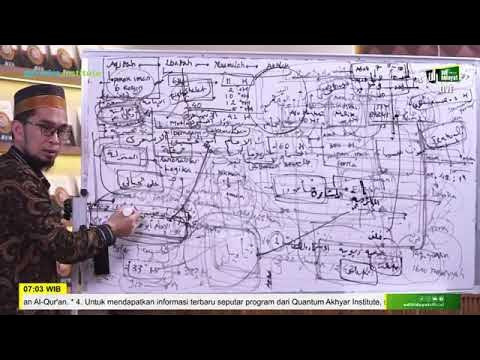Sengketa Khilafah (Part 1) - (Kitab Al-Ahkam Al-Shulthaniyyah - Bab 1 Imamah)
Summary
TLDRThis video discusses the criteria for the appointment of a head of state based on the Islamic tradition, particularly referencing Imam al-Maward's 'al-Ahkam as-Sulthaniyah.' It contrasts different viewpoints on the legitimacy of leadership selection, emphasizing the roles of Ahlul Halli Wal Aqdi and the importance of consensus among influential figures. The narrative explores the historical context of Abu Bakr's caliphate and the dynamics of the Saqifah Bani Sa'idah meeting, highlighting differing opinions on representation and authority in leadership succession. Ultimately, it underscores the complexity of establishing rightful governance in early Islamic history.
Takeaways
- 😀 Effective communication is essential for team success and fosters collaboration.
- 😀 Active listening helps in understanding diverse perspectives and resolving conflicts.
- 😀 Clear goals and expectations align team members towards common objectives.
- 😀 Regular feedback loops are crucial for continuous improvement and personal development.
- 😀 Emotional intelligence enhances interpersonal relationships and workplace dynamics.
- 😀 Building trust within a team leads to a more open and innovative environment.
- 😀 Adapting communication styles to suit different individuals improves interactions.
- 😀 Celebrating team successes boosts morale and reinforces positive behavior.
- 😀 Conflict resolution strategies are important for maintaining a healthy team culture.
- 😀 Ongoing training and development opportunities contribute to long-term team effectiveness.
Q & A
What is the main focus of the discussion in the transcript?
-The transcript primarily discusses the requirements and processes related to the selection and legitimacy of a head of state in the context of Islamic governance, specifically referencing the work of Imam Al-Mawardī.
What are the two main methods for appointing a head of state mentioned in the transcript?
-The two methods for appointing a head of state are through election by the council known as Ahlul Halli Wal Aqdi and through a mandate passed down from a previous leader.
What was the significance of the event at Saqifah Bani Sa'idah?
-The event at Saqifah Bani Sa'idah was crucial as it was the site where the early Muslims gathered to discuss and eventually decide on the leadership following the death of Prophet Muhammad, leading to the selection of Abu Bakr as the first caliph.
How does the transcript describe the legitimacy of leadership based on the number of people involved in the selection?
-The transcript outlines differing opinions on the number of council members needed for a legitimate selection. Some believe a majority is necessary, while others argue that as few as five individuals can validate the appointment.
What role did Abu Bakr play in the selection of the first caliph?
-Abu Bakr played a central role in the selection of the first caliph by advocating for himself and Umar during the discussions at Saqifah, ultimately being chosen as the leader.
What differing views exist regarding the selection process for the head of state?
-The differing views include whether a majority or a smaller group is sufficient for the selection, with some scholars arguing that one person can also suffice for the validation of a new leader.
What is the significance of the phrase 'Ahlul Halli Wal Aqdi' in this context?
-'Ahlul Halli Wal Aqdi' refers to the council or group responsible for making important decisions, including the appointment of leaders, reflecting a democratic approach within Islamic governance.
How did the early community's response to Abu Bakr's appointment reflect broader societal dynamics?
-The community's response was mixed, with some factions favoring Sayyidina Ali for leadership, indicating underlying political and social tensions within the early Muslim community.
What was the stance of Umar Ibn Khattab regarding the selection of leaders?
-Umar Ibn Khattab was supportive of Abu Bakr’s leadership and played an influential role in encouraging others to accept Abu Bakr as the caliph, highlighting his loyalty and commitment to the unity of the community.
What does the transcript reveal about the historical documentation of early Islamic leadership?
-The transcript references various historical texts that document the events surrounding the selection of the first caliph, emphasizing the importance of historical records in understanding the legitimacy and process of early Islamic governance.
Outlines

This section is available to paid users only. Please upgrade to access this part.
Upgrade NowMindmap

This section is available to paid users only. Please upgrade to access this part.
Upgrade NowKeywords

This section is available to paid users only. Please upgrade to access this part.
Upgrade NowHighlights

This section is available to paid users only. Please upgrade to access this part.
Upgrade NowTranscripts

This section is available to paid users only. Please upgrade to access this part.
Upgrade NowBrowse More Related Video

Sunnii: Al-Asy'arii, Al-Maaturiidii, dan Ibnu Taimiyyah - Ustadz Dr. (HC) Adi Hidayat, Lc., M.A.

AL MAWARDI - HAKIM AGUNG YANG MENERANGI DUNIA ISLAM | FAIRUS ABYUDAYA - 10 ABDURRAHMAN

KULTUM RAMADHAN #Day 16 Jangan Umbar Auratmu bersama Ustzh. Siti Aisyah, S.Pd.I

Konsep Tentang Ittihad dan Hulul Dalam Tashawuf

قول الشافعي لبعض جلسائه : سلوني عما شئتم أخبركم به من كتاب الله

EPS 48 Upaya Pembaruan Tasawu
5.0 / 5 (0 votes)